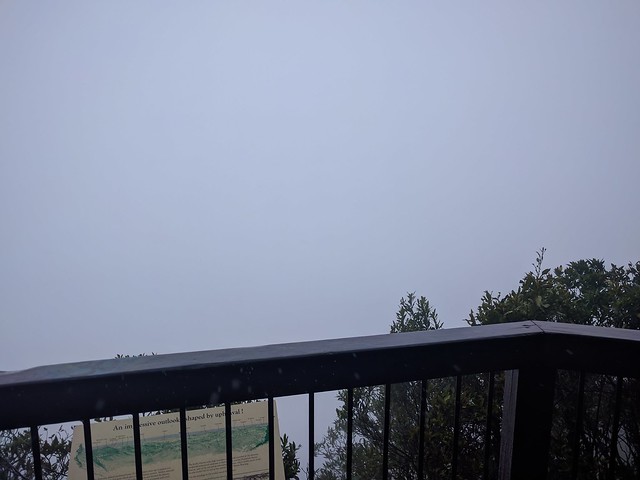By Jen.
By visiting some locations farther inland, we had burned enough time to be able to pick up my package of batteries from the post office. After that, I wanted to give Jonathan a taste of the Gold Coast. When I came to Australia before (freshman in high school, which is 16 years ago now) with my friend who was here for a golfing tour, we spent most of our time in the vicinity of the Gold Coast. Sure enough, as we traversed the streets to reach the coast, I was flooded with memories from that time. The city isn’t really the type of place Jonathan and I enjoy, but it is worth visiting just to see what other tourists experience.
This is pretty much what the coast looks like from Brisbane to the border with New South Whales.
Just the driving through town to the coast was enough to make us want to flee to the countryside via the fastest route. So we made a beeline to Springbrook National Park, but upon arriving, found the road blocked. A quick google showed that there were other entrances, so we started heading towards those. However, on the way, I was trying to book a campsite to stay that night and discovered that Springbrook’s campsites were all full (it was the weekend). I did find that the next park over, Lamington NP, had spots open. So, instead, we went to it. The drive was a bit longer than we expected as we had to drive up steep hills (alternating one-lane roads) through thick forest in the rain (it is a rainforest). But, we got there and got settled in and decided to walk Moran Falls track.
The pademelons were out in full force after the rain, chomping down on the grass.
On the way back, we stopped at a place where there was a trickle of water and endeavored to find a tree frog we heard. Instead, Jonathan spotted a large blue and white cray hiding in a hole under the path! I tried to get a picture of it, but it was too far in the hole and too dark. It was pretty massive, though.
Blue-bodied ants.
Colorful fungus.
The next day, I had planned on doing West Canungra Creek Circuit, but upon passing the info centre, found out that the path was closed. Instead, we decided to walk part of the Toolona Creek walk.
This is a brush box tree, leftover from when it was cooler and drier. They are dying out in the region because of the climate has changed. These giants are at least 1500 years old.
At Picnic Rock, we found a smaller version of the blue crays!
As well as an eel!
Then right next to the path, I spotted this red-bellied black snake. Pretty sure these can kill you. Jonathan and 2 other hikers walked about a meter from it without noticing and then I saw it.
This picture actually has 2 medium-sized crays in it. They are fighting over who gets to hide in the water under the leaves.
While I was endeavoring to get some awesome photos of this pair, I suddenly realized that about 20 leeches were crawling towards on the small rock that I was on. It had started raining shortly before and being next to the river, they were coming out in droves. I quickly decided that getting those pictures were not worth being lunch to these blood-sucking creatures and decided to keep going on the path. However, despite getting farther from the river, the leeches kept coming (though not in as large groups). Between the rain and the leeches, we decided it was too miserable to keep going, so we decided to head back the way we had come. I only wish I had stopped long enough to get a picture of all the leeches that were coming at us! Fortunately, by the time we had gotten back to Picnic Rock, the leeches had stopped and we were able to enjoy a more leisurely walk. Unfortunately, my camera batteries died. The lithium ones last a lot longer, but they don’t give me any warning before they die. There wasn’t too much to take a picture of before we got back, except for this elusive King Parrot. He had been tagged, so we assume he was used to people and being fed. He actually let us get quite close to him.
King Parrot, looking like he wants a snack.
FUN FACT: Until a month before this (late September), I had thought that Australia didn’t believe in cornmeal, and thus, cornbread. Turns out that they may not quite believe in those, but they do have something that works. Apparently “polenta” is made from corn as well. The difference between cornmeal and polenta is the coarseness of the grind. Polenta is a coarse grind; cornmeal is medium. I found this news very exciting, as I love me some cornbread. It makes a great cheap meal when you combine it with beans. After 8 months in this country, we were finally able to have some cornbread! The polenta definitely worked, now I just have to figure out how to cook it in my toaster oven without burning it, which I think I am finally getting an idea of how to do that.






















































